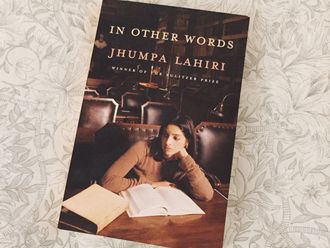
Have you ever wondered why the term “spoils” is used: as in “the spoils of war” and “division of the spoils”? Is it because dividing anything generally causes friction?
Ask anyone who has sat down with siblings to share out items and treasures from their parents’ home: Dividing property, however valuable or insignificant in monetary terms, can surely spoil relationships that were moving along fine until then.
In our family, photographs, crockery, recipe books, ornaments — all these were appropriated (or misappropriated) by one or other sibling each time they visited. We rarely went home all together, so it was common for us to suddenly notice a gap on the mantelpiece and demand, “Who took that?” and pout for a while, but eventually move on and lay claim to the next item that caught our fancy.
It started as a game, more to see who would back down first, but very soon I realised that there was no backing down with this soldier spouse nor was there any sweet talk: just cut throat bargaining and a like-it-or-lump-it approach that probably served him well in war games but did nothing for peaceful negotiations in the home
By the time my spouse and I set up our own home, the older siblings in our families had taken most of what they wanted from our respective parents’ homes but we were not really concerned because we knew we would not have a permanent home of our own for a long time.
So we made do with what we had received as wedding gifts and we acquired a few little treasures that we were inordinately proud of.
But we already had many young nieces and nephews on both sides of the family and when they saw something they were attracted to, they laid claim to it with a guileless, “When you die, I want that!”
So, we got down to first figuring out which side should have “family” claim to everything we owned: “This goes to my family; that goes to yours …”
Like-it-or-lump-it
Then we went one step further and we began to question which one of us should take each thing if we ever decided to go our separate ways. It started as a game, more to see who would back down first, but very soon I realised that there was no backing down with this soldier spouse nor was there any sweet talk: just cut throat bargaining and a like-it-or-lump-it approach that probably served him well in war games but did nothing for peaceful negotiations in the home.
I wondered why he could not say, “Well, if you don’t want me to take the music system, or will it to my people because it was a gift from my side of the family, then stay with me and we’ll listen to all those love songs together.”
More by the writer
It didn’t seem like a very difficult dialogue — especially since I heard so many versions of it in the movies. But in real life, no such luck. Instead, it was a curt, “The music system is mine. You can have everything from the kitchen: How’s that for generosity?”
In time, of course, our game became stale: a) because we stopped acquiring new things, having run through all the money we had kept aside for home improvement; b) because neither one of us seemed inclined to go off on our own; and c) because we now had living breathing souls in our care and there was no dividing up those, even if King Solomon were around to be judge and jury!
Still, as the years went by, after the loss of a life or that of a way of life, there has been occasion to divide up possessions — if not with each other then with siblings — and we have found that it is always painful, no matter how level-headedly we launch into the task. Because somehow, “material” things, even those we try not to set store by, seem to carry memories with them — and those memories return to us in flashes, re-creating the past and often spoiling the present for us.
Cheryl Rao is a journalist based in India.











